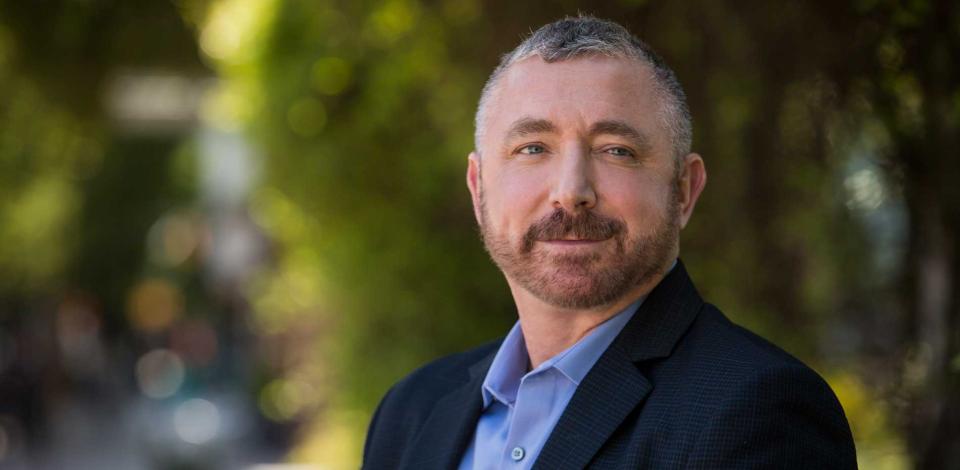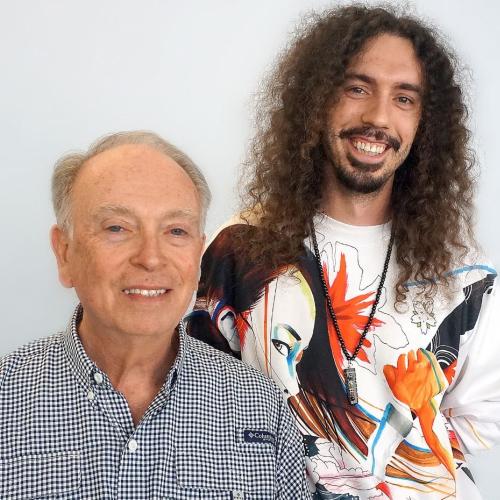Business and Analytics: A Winning Combination
Media tech professional shares his learner experience with Georgia Tech's Online Master of Science in Analytics

Written by Deirdra Harris Glover | Photography by Dane Sponberg
Media technology professional Dan Hawks knew going back to school would be challenging, especially while trying to achieve balance with his family and a full-time job. The Master of Science in Analytics (OMS Analytics) at Georgia Tech fit his lifestyle and his wallet.
“I started researching the program and, between being an Atlanta native and Georgia Tech being a part of the community that I live in, I was very interested in furthering my education with a great institute that’s right up the street from me,” said Hawks, who was selected to be a member of the inaugural OMS Analytics class.
Since 1992, Hawks has developed and managed custom advertising sales technology tools at ESPN, ABC Family Network, Turner Broadcasting Systems, and NBC Universal. He accepted a position with SAS Institute, Inc. in 2012, where he applies his media experience and newfound understanding of analytics for SAS media and communications clients, including NBC and Disney networks.
“The whole business model for television has been through constant disruption over the last 10 to 15 years,” Hawks said. "For technology professionals like myself, it’s a lot of fun to work in that space, but for people who don’t know the industry well enough, it can be confusing to break into.”
As Hawks settled into his role at SAS, he was intrigued by “what was under the hood” of SAS products. As his curiosity grew, he found himself searching for certification or education in analytics.
While SAS had in-house certification and professional development in analytics, Hawks couldn’t spare the time away from work for the six-week SAS program. He also wanted to gain analytics experience outside the SAS focus. Georgia Tech’s OMS Analytics program was more accommodating to his schedule.
“The price point for what Georgia Tech was offering was fantastic. The reputation Tech has as a high-quality technical institution — it’s exactly what I wanted,” he said.
Hawks, who earned his Bachelor of Science from Rensselaer Polytechnic Institute in 1991, found it difficult to get back into the routine of learning. The Georgia Tech online community helped ease Hawks back into the classroom. Instructors and teaching assistants responsively communicate with students through official forums and host office hours via video chat.
Hawks soon discovered that the majority of students used Slack, a collaborative cloud-based service. Program students have created “workspaces” for each class in the program as well as the OMS Analytics program in general.
“The students have done an amazing job getting material out to each other and sharing links to online resources that might prove helpful. Students are very responsive to other students who are asking questions, and more than that, there’s a social aspect. You can see that students are connecting to one another. There’s humor in what’s being put out there. There’s a sense of community, for sure,” Hawks said. Students also self-identify into location-based channels where they can meet up to collaborate. In Atlanta, students gather to share best practices regularly on Saturday afternoons at the Starbucks near the Braves Stadium Battery.
The OMS Analytics program offers flexible, self-paced learning schedules and an integrative model bringing together business, research, statistics, and computing expertise. Hawks appreciates the schedule because it allows him time to maintain his current position, spend time with his family, and he can even squeeze in a few social engagements as well.
The media industry keeps Hawks in New York City, and he capitalizes on his travel time by learning at 30,000 feet. “I’ve actually used the commute time on a plane to take in some lecture materials, or to do online research for some of the subjects being taught,” he said.
As a result of the program, Hawks can now do some of his own data engineering and modeling. “It’s intense work, and what you’re able to accomplish is remarkable! To be able to find insights from results of modeling and to be able to craft a story — there’s an art to it, there’s a science to it, and I have a lot of respect for the people who do it well,” remarked Hawks.
The OMS Analytics program has pushed Hawks to grow in many ways, and he counts it as a fantastic opportunity to learn from instructors and his peers. “This program is attracting people with backgrounds in business, math and statistics, and computer science. There are some extremely bright people in this program, and I’m a little intimidated by peers who have such a comfort level with the math and statistics part of it," said Hawks. “That’s where I have to push myself to keep up. It’s provided a lot of inspiration and personal challenge to me.”
While Hawks is receiving hands-on experience through the OMS Analytics program, he doesn’t see himself becoming a full-time practitioner. His studies are a way to enhance his current field of practice, gain insight into what technical resources can do, and help projects execute more efficiently. “Within media, there’s such a low level of analytic maturity that there’s a need for people who understand the big picture so they can guide major corporations through reinventing themselves,” he said.
“As the media industry quickly evolves, analytics and Big Data is becoming a big part of that story. Many companies do not know how to navigate these changes, and really don’t know how to embrace analytics, leverage it, and understand what it can do for them. I see myself working toward becoming a trusted advisor who can understand in great detail the data, the business, the analytics, and the technology,” Hawks concluded.

